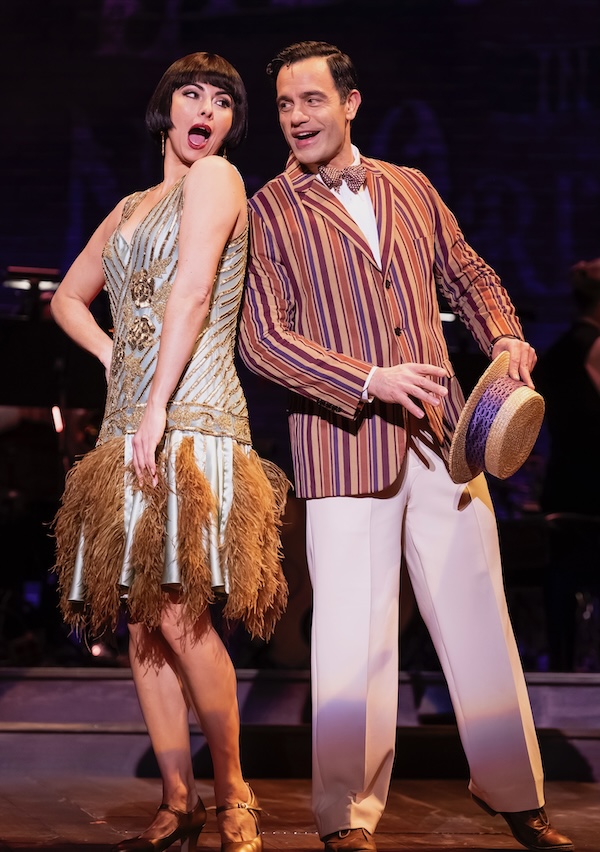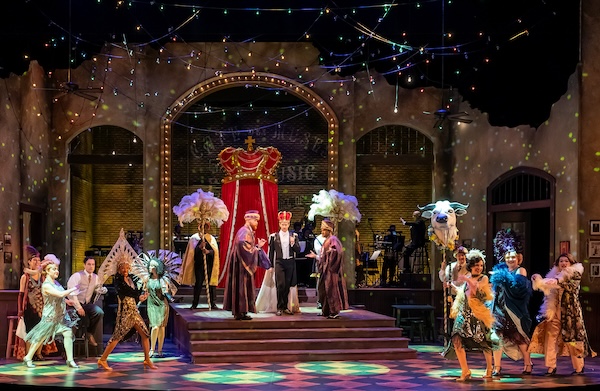Charismatic Leonard can’t save WNO’s lightweight Offenbach soufflé

Isabel Leonard and Ramin Karimloo star in Washington National Opera’s Songbird. Photo: Scott Suchman
Operetta is a guilty pleasure occasionally indulged by most opera companies. Washington National Opera has mounted Bernstein’s Candide, as well as operettas by Lehár and Strauss, over the years. The company has now gotten around to Jacques Offenbach’s La Périchole, but as reimagined in a jazz idiom and set in 1920s New Orleans. This leaden production, titled Songbird, opened Saturday night in the Kennedy Center Eisenhower Theater.
Offenbach’s opéra bouffe in three acts, set to a libretto by Henri Meilhac and Ludovic Halévy, originally told the story of a pair of Peruvian performers on the streets of Lima, La Périchole and her lover, Piquillo. These starving artists are duped into a scheme to get married, so that La Périchole can become the mistress of the Viceroy of Peru, without causing too much of a scandal. The character was based on a real woman in the 18th century, who became the basis of the operetta’s source play by Prosper Mérimée.
Director Eric Sean Fogel (who co-directed the original show with Francesca Zambello), conductor James Lowe, and lyricist Kelley Rourke have updated the work to New Orleans, in this extremely truncated version of the operetta created for the Glimmerglass Festival. It was better suited to that festival’s pandemic-era outdoor theater, called Glimmerglass on the Grass, where it premiered in 2021. At a slender 75 minutes of music, this airy bit of musical fluff fell flat when transferred indoors and ultimately felt like a waste of resources in an already thin WNO season.
Mezzo-soprano Isabel Leonard is nonetheless charming in the title role, with believable dance moves including a modest bit of tap dancing and a winning stage presence, in her bobbed haircut and flapper outfit. She brought natural ease and wit to the character’s music, which remained the most alluring parts of the work: the Letter Song (“O mon cher amant”), her drunken showpiece “Ah! quel dîner,” and especially “Tu n’es pas beau, tu n’es pas riche” in the third act.
Her Piquillo was Broadway actor Ramin Karimloo, which seemed a calculated bit of casting to draw in a non-operatic audience. Unfortunately, all the singers are miked for the evening, as well as the musicians of the pit band, which is about as un-operatic an experience as could be imagined. The amplification, which sounded wooden and at times was far too loud, only drew attention to the differences in vocal quality between Karimloo and the opera singers around him.

Photo: Scott Suchman
The technicolor villain of baritone Edward Nelson, whose Don Andrès is transformed into the mayor of New Orleans, proved the highlight of the evening. He camped it up in the Couplets de l’Incognito, where he put on a few costumes to show how he liked to sneak about unrecognized. In the Mardi Gras parade scenes, he was feted as Rex, the king of carnival, with the requisite trappings, including the white boeuf gras. (In a nice tie-in, that real-life Mardi gras parade outfit even has as its theme song a tune from a musical, “If I Ever Cease to Love.”)
Singers from the Cafritz Young Artists program filled out the rest of the cast, although most of the solo work was carried by the three leads. Jonathan Patton and Sahel Salam, as Don Pedro and Panatellas, worked far too hard to bring off an endless series of terrible puns passing as jokes. Many of the choral numbers ended up on the cutting room floor, but soprano Teresa Perrotta provided solid high notes in those that remained.
James Lowe’s jazz arrangement impressed with its adept and fluid style, complete with Dixieland touches from banjo player Jim Roberts and sousaphonist Andrew Hitz. Clarinetist David Jones wailed on some solid licks, including a funny turn where he came out from the band’s place at the back of the stage to interact with Nelson. Offenbach’s tunes were often recognizable, given a bluesy twist, and Rourke’s lyrics often retain parts of the original French texts.
The single set depicted the Café des Muses (designed by James F. Rotondo III), which made less and less sense as the evening proceeded, through the scenes set outdoors and in a prison. Costumes by Marsha Leboeuf and Timm Burrow (original designs by Christelle Matou) evoked New Orleans especially in the parade scene. Lighting became garish, for no particular reason, in the final scene (designed by Robert Wierzel). Opera fans may prefer to skip this one.
Songbird runs through March 23. kennedy-center.org
